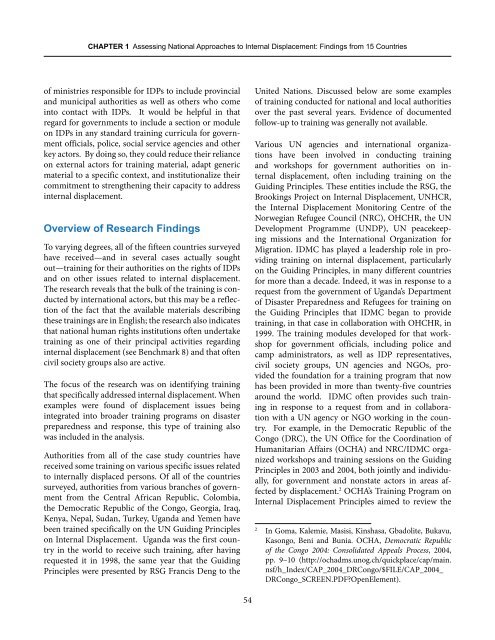From Responsibility to Response: Assessing National - Brookings
From Responsibility to Response: Assessing National - Brookings
From Responsibility to Response: Assessing National - Brookings
Create successful ePaper yourself
Turn your PDF publications into a flip-book with our unique Google optimized e-Paper software.
CHAPTER 1 <strong>Assessing</strong> <strong>National</strong> Approaches <strong>to</strong> Internal Displacement: Findings from 15 Countries<br />
of ministries responsible for IDPs <strong>to</strong> include provincial<br />
and municipal authorities as well as others who come<br />
in<strong>to</strong> contact with IDPs. It would be helpful in that<br />
regard for governments <strong>to</strong> include a section or module<br />
on IDPs in any standard training curricula for government<br />
officials, police, social service agencies and other<br />
key ac<strong>to</strong>rs. By doing so, they could reduce their reliance<br />
on external ac<strong>to</strong>rs for training material, adapt generic<br />
material <strong>to</strong> a specific context, and institutionalize their<br />
commitment <strong>to</strong> strengthening their capacity <strong>to</strong> address<br />
internal displacement.<br />
Overview of Research Findings<br />
To varying degrees, all of the fifteen countries surveyed<br />
have received—and in several cases actually sought<br />
out—training for their authorities on the rights of IDPs<br />
and on other issues related <strong>to</strong> internal displacement.<br />
The research reveals that the bulk of the training is conducted<br />
by international ac<strong>to</strong>rs, but this may be a reflection<br />
of the fact that the available materials describing<br />
these trainings are in English; the research also indicates<br />
that national human rights institutions often undertake<br />
training as one of their principal activities regarding<br />
internal displacement (see Benchmark 8) and that often<br />
civil society groups also are active.<br />
The focus of the research was on identifying training<br />
that specifically addressed internal displacement. When<br />
examples were found of displacement issues being<br />
integrated in<strong>to</strong> broader training programs on disaster<br />
preparedness and response, this type of training also<br />
was included in the analysis.<br />
Authorities from all of the case study countries have<br />
received some training on various specific issues related<br />
<strong>to</strong> internally displaced persons. Of all of the countries<br />
surveyed, authorities from various branches of government<br />
from the Central African Republic, Colombia,<br />
the Democratic Republic of the Congo, Georgia, Iraq,<br />
Kenya, Nepal, Sudan, Turkey, Uganda and Yemen have<br />
been trained specifically on the UN Guiding Principles<br />
on Internal Displacement. Uganda was the first country<br />
in the world <strong>to</strong> receive such training, after having<br />
requested it in 1998, the same year that the Guiding<br />
Principles were presented by RSG Francis Deng <strong>to</strong> the<br />
54<br />
United Nations. Discussed below are some examples<br />
of training conducted for national and local authorities<br />
over the past several years. Evidence of documented<br />
follow-up <strong>to</strong> training was generally not available.<br />
Various UN agencies and international organizations<br />
have been involved in conducting training<br />
and workshops for government authorities on internal<br />
displacement, often including training on the<br />
Guiding Principles. These entities include the RSG, the<br />
<strong>Brookings</strong> Project on Internal Displacement, UNHCR,<br />
the Internal Displacement Moni<strong>to</strong>ring Centre of the<br />
Norwegian Refugee Council (NRC), OHCHR, the UN<br />
Development Programme (UNDP), UN peacekeeping<br />
missions and the International Organization for<br />
Migration. IDMC has played a leadership role in providing<br />
training on internal displacement, particularly<br />
on the Guiding Principles, in many different countries<br />
for more than a decade. Indeed, it was in response <strong>to</strong> a<br />
request from the government of Uganda’s Department<br />
of Disaster Preparedness and Refugees for training on<br />
the Guiding Principles that IDMC began <strong>to</strong> provide<br />
training, in that case in collaboration with OHCHR, in<br />
1999. The training modules developed for that workshop<br />
for government officials, including police and<br />
camp administra<strong>to</strong>rs, as well as IDP representatives,<br />
civil society groups, UN agencies and NGOs, provided<br />
the foundation for a training program that now<br />
has been provided in more than twenty-five countries<br />
around the world. IDMC often provides such training<br />
in response <strong>to</strong> a request from and in collaboration<br />
with a UN agency or NGO working in the country.<br />
For example, in the Democratic Republic of the<br />
Congo (DRC), the UN Office for the Coordination of<br />
Humanitarian Affairs (OCHA) and NRC/IDMC organized<br />
workshops and training sessions on the Guiding<br />
Principles in 2003 and 2004, both jointly and individually,<br />
for government and nonstate ac<strong>to</strong>rs in areas affected<br />
by displacement. 2 OCHA’s Training Program on<br />
Internal Displacement Principles aimed <strong>to</strong> review the<br />
2 In Goma, Kalemie, Masisi, Kinshasa, Gbadolite, Bukavu,<br />
Kasongo, Beni and Bunia. OCHA, Democratic Republic<br />
of the Congo 2004: Consolidated Appeals Process, 2004,<br />
pp. 9–10 (http://ochadms.unog.ch/quickplace/cap/main.<br />
nsf/h_Index/CAP_2004_DRCongo/$FILE/CAP_2004_<br />
DRCongo_SCREEN.PDF?OpenElement).

















